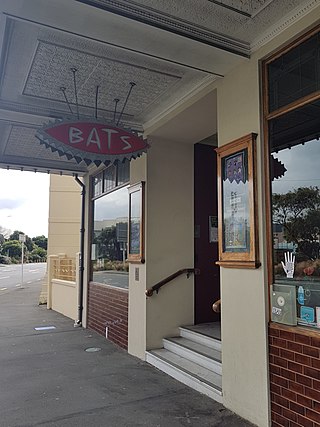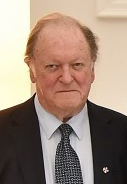
BATS Theatre is a theatre venue in Wellington, New Zealand. Initially founded as the Bats Theatre Company in 1976, then established in its current form in 1989. BATS Theatre has seen the development of many performing arts talents of New Zealand.

Paul Allan Maunder is a New Zealand film director, playwright and cultural activist. He is best known for his 1979 film of the novel Sons for the Return Home by Albert Wendt, his 1983 play Hemi about the life of James K. Baxter, and his work in community-based theatre.
Martyn Sanderson was a New Zealand actor, director, producer, writer and poet.

Victor John Rodger is a New Zealand journalist, actor and award-winning playwright of Samoan and Pākehā heritage. Rodger's play Sons won acclaim at the Chapman Tripp Theatre Awards (1998) and received the Best New Writer and Most Outstanding New New Zealand Play awards. In 2001, he won the Bruce Mason Playwriting Award. Other plays include Ranterstantrum (2002) and My Name is Gary Cooper (2007), produced and staged by Auckland Theatre Company and starred a Samoan cast including Robbie Magasiva, Anapela Polataivao, Goretti Chadwick and Kiwi actress Jennifer Ward-Lealand.

The Hannah Playhouse is a theatre venue situated on the corner of Courtenay Place and Cambridge Terrace in central Wellington, New Zealand. The Hannah Playhouse was given by Sheilah Winn and named after her grandfather, Robert Hannah, a very successful businessman. It was carefully designed and built to house Downstage Theatre.

Sarah Delahunty is a New Zealand writer and director who was born in Wellington. An award-winning playwright, Delahunty has written over 30 plays, often focussing on works for youth.

Gary Henderson is a New Zealand playwright, director and teacher. Henderson's work has been produced both nationally and internationally with his play Skin Tight having travelled to Edinburgh, New York City and Canada. Whilst at the 1998 Edinburgh Fringe Festival it won the Fringe First Award. In 2013 Henderson received a $20,000 Playmarket Award, acknowledging his contribution to New Zealand theatre.
Jean Betts is a New Zealand playwright, actor and director.
Taki Rua is a theatre organisation based in Wellington, New Zealand that has produced many contemporary Māori theatre productions. Taki Rua has been going since 1983 and has had several name changes over that time including The New Depot, Depot Theatre and Taki Rua / The Depot. The full current name is Taki Rua Productions. Since inception the mission of Taki Rua has been to showcase work from New Zealand. Because of this and the longevity of Taki Rua many significant New Zealand actors, directors, writers, designers and producers have part of the history including Riwia Brown, Nathaniel Lees, Rachel House and Taika Waititi.
Raymond Stanley Boyce was a British-New Zealand stage designer, costume designer and puppeteer and puppet designer. Boyce was part of the start professional theatre movement in New Zealand influencing the artistic landscape with his design knowledge. Boyce designed hundreds of theatre shows and was named an Arts Foundation of New Zealand Icon in 2007.
Sunny Amey is a theatre director and educator born in New Zealand. She worked at the National Theatre of England during its formative years alongside Laurence Olivier, as artistic director of Downstage Theatre in the 1970s and the director of New Zealand's national drama school Toi Whakaari in the late 1980s.

William Newton Sheat was a New Zealand lawyer and arts advocate whose input was instrumental in many arts organisations including as a founding member of the New Zealand Film Commission, Creative New Zealand and Downstage Theatre.
The Ngā Whakarākei O Whātaitai /WellingtonTheatre Awards are the main theatre awards in New Zealand's capital city, Wellington established in 2015 after the previous awards sponsor ended their support. They are awarded annually.
Massive Theatre Company, also called Massive or Massive Company, is a professional theatre company in Auckland, Aotearoa New Zealand.

The Kia Mau Festival, previously called Ahi Kaa Festival, is a biennial performing arts festival in Wellington, New Zealand. In te reo Māori, kia mau is "a call to stay - an invitation to join us".
Catherine Patricia Downes is a New Zealand theatre director, actor, dramaturg and playwright. Of Māori descent, she affiliates to Ngāi Tahu. Downes wrote a one-woman play The Case of Katherine Mansfield, which she has performed more than 1000 times in six countries over twenty years. She has been the artistic director of the Court Theatre in Christchurch and the director of Downstage Theatre in Wellington. She lives on Waiheke Island and works as a freelance actor, director and playwright.
Wednesday to Come is the first play in a trilogy by New Zealand playwright Renée. The second play in the trilogy is Pass It On, and the third is Jeannie Once. The play follows the women of a family during the Great Depression in New Zealand.
Jason Te Kare is a New Zealand director, playwright and actor.

Jan Patricia Bolwell is a Wellington-based New Zealand playwright, choreographer, director, dancer and teacher of dance. She established the Crows Feet Dance Collective in 1999 and remains its director.

David John O'Donnell is a New Zealand theatre director, actor, and academic based in Wellington, New Zealand. He has taught at Victoria University of Wellington since 1999, and is as of 2021 a full professor.


















